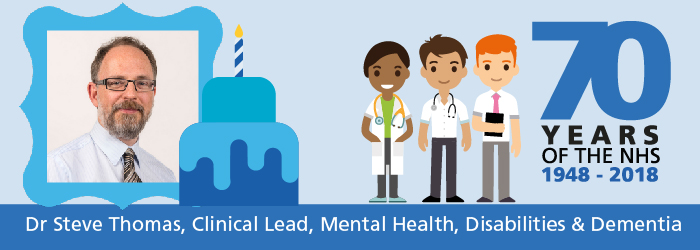
NHS70 mental health focus

Dr Steve Thomas is the clinical lead for mental health, learning disabilities and dementia at NHS Sheffield CCG. He qualified in 1993 and was a partner at Dykes Hall Medical Centre in Sheffield for 16 years. As well as his work for the CCG he also practices at Manchester Road and Firth Park in the city.
It was in his early days of practice that he quickly recognised how emotional problems, particularly in the care of people with long-term conditions, were significant issues and this was the start of his passion for mental health.
All the key changes he has seen over recent years have had partnership working across the city at their very core.
“I worked in an innovative GP practice and in the mid-1990s and early 2000s, like many other practices, we established counselling for the management of common mental illnesses such as depression and anxiety.
“We worked closely with a community psychiatric nurse which put us in a strong position when the national Improving Access to Psychological Therapies (IAPT) programme came about in 2007.
“I was involved in the training for new psychological wellbeing practitioners and the end result was that workers were present in each of the surgeries across the city as well as a central resource (currently St George's Community Health Centre.) This and the opportunity for people to refer themselves, rather than only through their GP, was a significant development.
“In addition the resources provided through the IAPT website - the opportunity for Skype consultations ,workshops for people, text alerts,– these sorts of services simply just did not exist before.”
Nationally we know that one in four of us will have problems with our mental health at some time in our lives. We also know that nearly nine out of 10 people with mental health problems say that stigma and discrimination have a negative effect on their lives so work to tackle this is key.
Dr Thomas said: “Another major change over recent year has been the concept of 'Parity of Esteem' – essentially valuing mental health equally with physical health – and the ability to accept we are ‘whole people’ which means we need to treat and plan for mental and physical health equally.
“GPs are also increasingly moving away from reactive care and looking to spot potential problems at an earlier stage and to work with people to prevent them wherever they can.
“This is essential in promoting mental health wellness as well as early prevention of illness when we know that nearly 75% of lifelong mental illness has already been established by the time a young person reaches the age of 20.
“An example of more proactive early intervention is our city’s alcohol screening tool which helps us quickly and easily screen people for problematic drinking – and then give them the support and advice they need to prevent future problems.
“With alcohol and substance misuse, there is also the opportunity for people to self-refer for help and support rather than going to their GP first.”
Partnership working is the vital element for developing and improving the city’s health and social care future – and preventing ill health with be a priority for everyone involved.
“Working in partnership with voluntary, community and faith sectors we have seen increased 'social prescribing'. Social prescribing is about linking people up to social or physical activities in their community – a non-medical option that can work alongside existing treatments to improve health and well-being.
“There are now 600 referrals a month for people to access activities which can help them with their mental and physical health – whether it’s helping with managing debt, benefits and housing to therapeutic gardening or baking classes!
“The Sheffield Mental Health Guide, jointly commissioned with the city council is an amazing resource which helps identify all the support that is out there.
“And there is a genuine desire in the system to work with carers and the people who have used services, or are still using them, to be involved in developing future care and support. For example people with lived experience are part of the steering group to look at reviewing psychology services. We need to do more of this together with the public.
“We are working with our voluntary, faith and community sector, which includes charities, social enterprises and voluntary groups, to look at shaping future services for dementia. About 6,500 people over 65 in the city live with dementia and 86% have a diagnosis, and as a result have access to care and support.
“As a city we want to understand how we can support people to stay in work, ‘live well’ with dementia and how we can help destigmatise the illness.
“We also know that people with learning disabilities have poorer health and die at a younger age – often 20 to 30 years earlier than the general population. This is mostly due chronic their physical health conditions not being dealt with as vigorously as the rest of the population, So, nearly all the GP practices in the city have signed up to ensure that they recognise these vulnerable groups, do really robust health checks for them and health action plans. This is good news - but there is still a lot more to be done.”
Another area of significant improvement is how people are being treated more holistically in our 'physical health' hospitals. The impact of unrecognised mental ill health on physical illness is now far better understood.
“We now have much better integrated working with psychologists, psychiatrists and specially trained nurses working at the teaching hospital to help people recover more quickly and have a better experience of care with less chance of relapse.
“We now need to work hard in developing strategies and services, particularly with families and our young people that continue to promote mental wellbeing and tackle illness at an earlier stage.”


 Translate this page
Translate this page